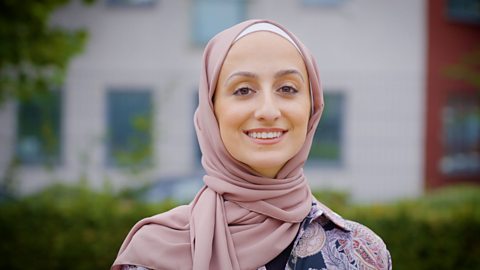If you're a fan of the Alex Rider spy adventures or the James Bond movies and wondered if you've got what it takes to be a real-life spy then read on.
Īꔄtv Bitesize Careers has been speaking with one of the top bosses at UK intelligence agency It stands for Government Communications Headquarters (GCHQ) and it is the UK‚Äôs intelligence, security and cyber agency. ‚Äď a job so secretive that we can't use her full name. She's called Hannah and she's the Director General of Technology and her specialist team creates and uses technology to disrupt threats and keep the UK safe. Here she answers our questions about what it's really like to be involved in the world of spies.
What is GCHQ?
 Image source, GCHQ © Crown Copyright
Image source, GCHQ © Crown Copyrightis the UK’s intelligence, security and cyber agency. Their aim is to protect the UK both online and in the real world from things like cyber attacks, terrorism and serious crime. They do this through accessing and interpreting the communications of people around the world who might want to harm our country.
GCHQ is one of three UK intelligence agencies that protect national security. The others are the Security Service MI5 and the Secret Intelligence Service MI6 (where James Bond works in the films). GCHQ specialises in gaining intelligence (useful information) from communications on mobile phones and the internet. MI5 focuses more on gathering intelligence in the UK to identify and disrupt threats to the country, and MI6 works across the world to protect the UK from overseas threats.
 Image source, GCHQ © Crown Copyright
Image source, GCHQ ¬© Crown CopyrightWho works at GCHQ, and are they ‚Äėspies‚Äô?
When people think of spies they think of James Bond, but we welcome everyone, we need a whole mix of people.

GCHQ is a large organisation and employs people in areas like HR, finance, communications and cyber security, as well as in specialist technical roles, languages, analytics, intelligence reporting and mathematics. STEM subjects can be useful for jobs here, alongside foreign languages.
In Hannah’s job as Director General of Technology, she looks after a team of tech specialists like software developers, data scientists and artificial intelligence (AI) specialists. She’s always had an interest in computers and technology, but didn’t start her career at GCHQ. In fact, she’d never heard of it until she got a job at the civil service (which provides lots of different services to the public) after university.


Hannah looks after a big team of people who ‚Äúundertake technical operations and research‚ÄĚ which can be used to identify and stop risks to the UK. This includes looking at things like how the team get data, understanding that data, building applications and hardware, experimenting with new technologies and AI. Some of those technologies are used to provide intelligence on criminals in order to keep the country safe.
"It's not really like working in a James Bond movie", says Hannah, "I think it's much better. It’s real, where the book plays with stereotypes… I work with a huge diverse mix of people, who think differently. People who care about the mission and work with cutting-edge technology every day." Hannah also knows the real-life Q (a tech-savvy male character who supplies Bond with cool new inventions in the Bond films): "She’s a woman, and she’s awesome!"

Why do people work in British intelligence?
Hannah says: ‚ÄúEveryone is very passionate about what we‚Äôre doing ‚Äď helping to keep the country and the world safer.‚ÄĚ She adds that her team uses an important mix of technical and creative skills: they need to have the technical ability and the vision to foresee ways in which that technology could be used.
How do I get a job at GCHQ?
Don‚Äôt write yourself off based on stereotypes ‚Äď all sorts of people work here.

Not all the jobs on offer need a degree. For some, such as the Intelligence Analyst roles, you can apply if you have at least two GCSEs, or equivalent, at grade 4/C or above in Maths and English. A key part of applications, Hannah says, is highlighting your passion and enthusiasm. If you can show you‚Äôve got an aptitude and willingness to learn a skill that's in demand, like computer coding or a foreign language, then GCHQ can take you in and train you on the job. Another crucial aspect is teamwork ‚Äď you need to be able to work well with others. Vacancies are advertised on job boards, GCHQ's website and on social media.
As an ethnic minority woman, I want us to represent the rich culture of the UK population.
Hannah emphasises the organisation is open to anyone: ‚ÄúAs an ethnic minority woman, I want us to represent the rich culture of the UK population. We have some amazing people here but we‚Äôre not yet representing the society we serve, so I hope we can encourage more people to consider a career in intelligence.‚ÄĚ She adds that they ‚Äúsuper welcome applications from neurodivergent people‚ÄĚ and that any British citizen can apply.

Is it safe to work at GCHQ?
Hannah says she feels ‚Äúreally safe. There‚Äôs a lot of protection around our identities and what we do.‚ÄĚ Employees are warned to be mindful of what they post on social media. If you‚Äôre offered a role, you‚Äôll be able to keep your accounts and post under your own name, but you won‚Äôt be allowed to post about your job or what you‚Äôre doing at GCHQ ‚Äď it's all top secret!
Subjects that might be useful:
- Maths
- Computer Science
- Physics
- Engineering
- Languages
- foundational subjects you’ve learnt yourself, like coding.
Explore job profiles related to the subjects you like.
Skills that might be useful:
- Passion for the job
- Willingness to learn
- Creativity
- Curiosity
- Integrity
- Teamwork
- Specialist skills in things like technology, maths or languages.
Head to our skills and qualities page to learn more about skills for work.

How to become a spy: Q&A
Hannah recently answered questions at the Cheltenham Science Festival. Can you guess what she said?
Do you wear disguises?
I was asked if I wanted to wear a wig once, for a talk at a school’s event, but I decided it would be too itchy!
Is it hard to keep secrets?
It’s helpful to work with other people who understand what you do, so gradually you get used to it. There are some secrets that are really important…
What did you study at school?
I loved Science and Maths at school, but I studied something else at University, and then got a job with the MOD (Ministry of Defence) so my love of technology could continue.
Are you worried about AI and will it become more intelligent than humans?
I'm worried about the bias in AI (Artificial Intelligence), but it’s not more intelligent than humans… yet!
What’s your favourite mission?
Helping keep the UK safe during the Covid vaccination development and protecting our intellectual property.
What’s been your best achievement in your job?
There are no ‚Äėsolo‚Äô achievements at GCHQ really, so I‚Äôm proudest of all the things my team do.

Where could my skills take me?
Quiz: What’s the perfect career for you? quiz
Try this fun quiz to find out about the types of jobs you might enjoy and different careers you could consider.


